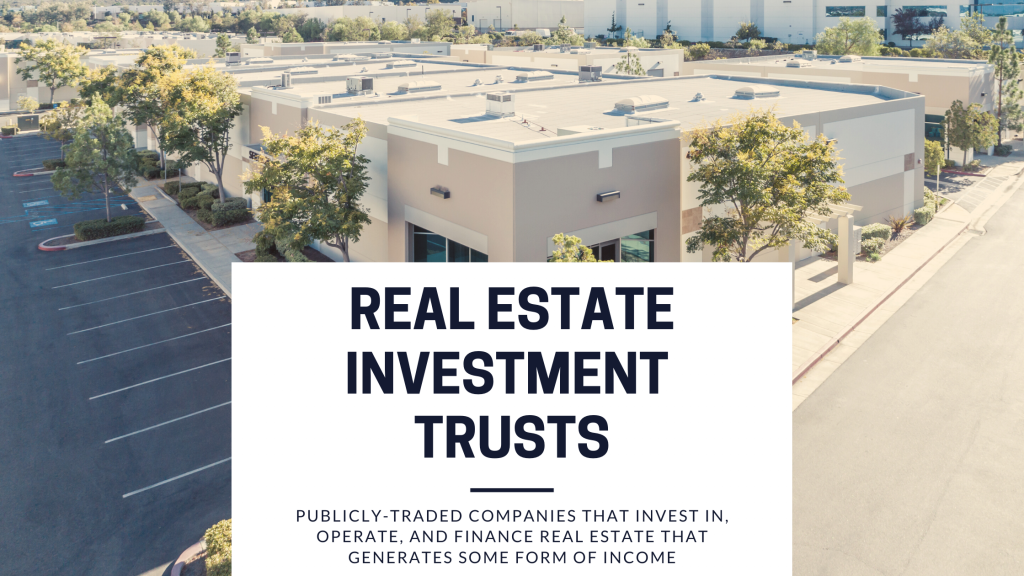Quick Summary
REIT stands for Real Estate Investment Trust. It is similar to a mutual fund, except that instead of pooling money to purchase stocks and bonds, the primary focus of a REIT is to acquire income-producing commercial properties. Crucially, REITs are required to distribute 90% of all taxable income to investors, in the form of dividends.
While there are many different ways to compare REITs vs Real Estate, this article will focus on rental property investing specifically, because REITs are ultimately built on the same underlying principle (that being the acquisition of income-producing rental property).
Now let’s take a closer look at the pros and cons of each approach.
Pros of REITs

1. Consistent Dividend Payouts
“By law, REITs have to pay at least 90% of taxable income to shareholders, and it’s not uncommon to have a 5% dividend yield—or more”. To put it another way, if you were to invest $100 in a top-performing REIT, it is realistic to get paid back $5 dollars in the form of dividends over the course of a year.
What’s more, the underlying value of the REIT may appreciate over time. This means you get the benefit of regular dividend payouts combined with the power of asset appreciation if the value of your chosen REIT grows over time.
2. No Monthly Mortgage Repayments
With REITs, there is no monthly mortgage repayment required. Naturally, there are major benefits to investing in your REIT of choice consistently, but the point is, you are not tied down to a legal agreement which requires you to make monthly payments for decades. Instead, you have the choice to invest as much or as little as you want. This freedom can be liberating for investors that are still establishing their financial foundations.
3. Require Very Little Capital To Get Started
To purchase an investment property, most people will need to put down anywhere between 10% and 25% of the property value. This can prove to be a financial barrier that some individual investors will never breakdown.
Fortunately, you can avoid the challenge of saving for a down payment by opting for REITS instead. In most cases, a minimum investment $500 to $1000 is all you need to open a brokerage account and invest in a Real Estate Investment Trust.
4. Passive Income Potential
Where managing rental properties is typically considered an active investment strategy (even if you use a real estate agency), REITs are classified as passive income.
It’s easy to understand why. All the work is effectively done by the company managing the REIT. Your sole function is to provide capital by purchasing the REIT. Once the REIT is transferred to your brokerage account, there is nothing else for you to do (except maybe put your feet up).
5. You don't have to be a property investment expert
Of course, you need to research the best possible REIT to add to your portfolio, but you don’t need intricate knowledge of the residential or commercial property. This can be a saving grace for individual investors that lack the knowledge and skills required to be a successful real estate investor. Instead, you simply need to put your money and trust into companies that quite literally specialize in generating income through commercial property.
6. Publicly Traded REITs Have High Liquidity
Unlike traditional real estate investing, REITs are highly liquid. Even an inexperienced investor should find it very easy to buy and sell a publicly-traded REIT using a brokerage account.
This makes publicly traded REITS very flexible. Instead of having your capital tied up in a physical property that could take months to sell, you can usually exit your position within hours. There is no downside to the highly liquid nature of this investment vehicle.
7. More Balanced Exposure To The Real Estate Market
With direct real estate investing, most individuals and small business owners will be exposed to a limited section of the real estate market, consisting mainly of small scale residential or commercial buildings. In contrast, the average REIT will hold a number of commercial buildings, often spread out over multiple areas. This can limit the amount of risk you are exposed to as an individual investor.
Cons of REITs

1. Limited Tax Benefits
Unlike rental property investing, REITS are actually somewhat limited in terms of the tax benefits they offer. The big attraction of REITs is the consistent dividend payouts that you are entitled to receive. However, the issue is with these dividends is that they are taxed as ordinary income. This means that every dividend you received through the REIT of your choice, is taxed at the marginal tax rate that you fall into. There is no clever workaround for this classification.
2. Limited capital growth
The downside to all the dividend income that you are entitled to receive when investing in a REIT is that it can limit the trust’s ability to acquire new properties and grow the underlying value of the asset pool.
Fortunately, there are ways for publicly-traded REITs to raise additional capital, but the dividend structure will always act as a constraint to large-scale expansion in short periods of time.
3. Limited Control
Beyond selecting the best possible REIT for your particular investment aspirations, there is very little that you can do once the REITs are allocated to your brokerage account.
This is a passive position, which severely limits your ability to influence the performance of the investment. On the other hand, if you invest in real property, you can play a massive role in the overall performance of the asset. For instance, if you have the contracting experience, you could perform renovations to boost the after repair value of the property. There is no equivalent form of control when investing in a real estate investment trust.
4. Stock Market Exposure
Although most publicly-traded REITs are more resilient than stocks to general market movements, there is still an element of correlation that can impact the valuation of the REIT.
This differs from investing in real property, where movements in the stock market are unlikely to impact the value of the home (unless a major financial crisis impacts the overall economy).
Benefits of Direct Investing In Real Estate

1. Monthly Rental Income
Of all the benefits associated with owning a rental property, rental income has to be number one. In most cases, the underlying goal of a typical rental property investor is to achieve a cashflow positive status as soon as possible after taking ownership of the property.
Fortunately, this goal is made significantly easier by the rental income you are legally entitled to receive every month. Moreover, you can also bank on annual rental increases to improve the cash flow status of the property over time. The end result is that a well-executed rental property purchase can become a cash cow that will serve you indefinitely.
2. Property Appreciation
Another major benefit of owning rental property is that properties in the United States tend to increase in value over a long term time horizon. There may be periods of downward activity, with the global financial crisis of 2008 being a prime example, but on average, the trajectory has been trending upward from the 1980s and onwards.
This is excellent news for aspiring rental property owners because it means you have two separate channels helping to build your net worth. The first channel is the monthly rental income, while the second channel is the equity in the property that will increase as the value of the property increases.
3. Your tenants can pay off your bond
If you use a rental property loan to fund your investment property purchase, it is entirely possible for your tenants to cover your mortgage obligations and all the expenses associated with the property, while still leaving room for net profit. In other words, you are effectively using other people’s money to build your own net worth.
4. Inflation Makes Your Bond Repayments More Affordable
The simple truth is that a dollar today is worth more than a dollar one year from now, based purely on the power of positive inflation. Moreover, it has been over 50 years since the US experienced negative inflation, so it’s a pretty safe bet to assume this trend will continue for some time to come.
This is good news for real estate investors because it means your bond repayments effectively become cheaper over time (assuming you agree to a fixed rate with your loan provider). When combined with annual rental increases, the cash flow status of your rental property should increase, while the challenge of making your bond repayments decreases.
5. Very powerful tax benefits
If you aspire to own an investment property, you might be surprised by the tax benefits you can unlock in the process.
Major Tax Benefit 1: A large array of tax-deductible expenses
Rental property owners can deduct the following expenses from their tax return:
- Property tax
- Property insurance
- Mortgage interest
- Property management fees
- Property repairs and maintenance
- Capital improvements
Collectively, these deductions can significantly reduce your tax burden as an individual investor. This stands in stark contrast to REITs, where the dividend income is treated like income tax, in accordance with your marginal tax rate.
Major Tax Benefit 2: Property Depreciation: If you aren’t very familiar with real estate investments, you might think that depreciation is a bad thing. The key is to understand that depreciation is actually a tax benefit that allows you to deduct a percentage of the property’s purchase price from your tax returns annually.
According to Investopedia “most U.S. residential rental property is depreciated at a rate of 3.636% each year for 27.5 years.“
Major Tax Benefit 3: The ability to defer capital gains tax
If you sell your investment property but reinvest the proceeds into a similar property, it is possible for you to defer the capital gains tax using a 1031 exchange. This doesn’t mean that you never have to pay capital gains tax. It simply means that you delay this particular form of tax by reinvesting the proceeds from the sale into another investment property.
Disadvantages of Investing In Real Estate

1. Low Liquidity
Unlike a typical REIT, selling real property can be a tremendous challenge, especially when the market conditions are challenging.
In most cases, selling a property in less than a month can be considered an achievement, and it is not uncommon for a property to take more than three months to sell. It is important to be aware of this risk long before taking ownership of an investment property.
2. Bond Repayments Can Be A Lifelong Challenge
In the US, the most common bond term for residential home loans and investment property loans is 30 years. If you choose not to pay anything extra toward your bond over that time period, you are effectively tied to a financial commitment that spans three decades.
Fortunately, your tenants can take on the bulk of this responsibility, but you are still liable for any shortfalls that may exist between the bond repayment and the rental income generated by the property.
3. You will experience periods without tenants
When calculating the expected cash flow status of a rental property, it is recommended to build in a vacancy rate percentage ranging from 3-8%. In so doing, you are factoring in the cost of inevitable periods without tenants.
During these times, you will be liable for all the costs associated with the property, without any income offset those costs. Naturally, you will want to find a replacement tenant as soon as possible, but you still need to be prepared for occupancy rate challenges.
4. A Big Down Payment Is Usually Required
One of the big upsides of REITs is that the Minimum Investment can be as low as $500. This makes REITs one of the most accessible real estate investments currently available.
With an investment property, however, a good target to aim for is 20% of the purchase price. For a $250,000 home, that would mean a deposit of $50,000, which isn’t a small sum of money by any stretch of the imagination. Ultimately, saving enough for the down payment can be an insurmountable challenge for some investors. It’s a big drawback.
5. Lack of Diversification
For many people, purchasing a physical property outright may require a huge portion of the funds they have available for investing. This makes it somewhat risky because if you buy a single property, you are essentially tied into a single asset class. Technically, this represents the very opposite of diversification.
6. The Risk of Foreclosure Is Real
Of all the risks associated with owning property, the possibility of foreclosure is by far the worst. You can manage this risk by selecting a property that is:
- Affordable
- Can become cash-flow positive quickly
- Based in a good area with high occupancy rates
Nevertheless, if you fall into arrears with your payments for whatever reason, you could lose the ownership rights of your investment property.
Final Thoughts
In the end, it should be plain to see that the pros far outweigh the cons for both direct real estate investing and REITs. If you’re still undecided at this point, these final tips may help.
REITs are an excellent choice if:
- You don’t want to take on the financial burden of a bond
- You have a limited amount of money to invest each month
- You have very little real estate investing experience
- You don’t want any personal interaction with tenants or real estate agents
- You want exposure to commercial real estate
Rental Property Investing might the better choice if:
- You know how to identify cash flow positive properties
- You want to maximize all possible tax benefits
- You can satisfy the bond repayments easily
- You are a buy-and-hold investor hoping to maximize your net worth through property appreciation
- You want a reliable monthly income stream
- You know how to use property depreciation to further offset your tax liabilities

